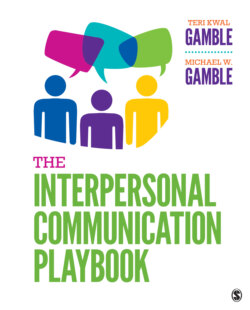Читать книгу The Interpersonal Communication Playbook - Teri Kwal Gamble - Страница 25
На сайте Литреса книга снята с продажи.
Feedback
ОглавлениеFeedback is information we receive in response to messages we have sent. Both verbal and nonverbal, it lets us know how another person is responding to us. Feedback offers clues as to how we are coming across, whether we were heard through the noise, and how the receiver interpreted our communicative efforts. Feedback reveals whether or not our message was interpreted as we hoped and, if not, which portions of the message need to be resent.
Feedback can be positive or negative. Positive feedback enhances behavior in progress. It serves a reinforcing function, causing us to continue our behavior. In contrast, negative feedback stops behavior in progress. It serves a corrective function, prompting us to discontinue one or more behaviors because of their apparent ineffectiveness. In this way, negative feedback helps eliminate behavior that others judge inappropriate.
Because we constantly communicate with ourselves (even as we communicate interpersonally), feedback can emanate from both internal and external sources. Internal feedback is the feedback you give yourself as you assess your own performance during an interpersonal transaction. External feedback is feedback you receive from the other person. Competent communicators are sensitive to both feedback types, since both serve important functions.
Feedback often focuses on a person or a message. We can, for example, comment on a person’s appearance or message effectiveness. In addition, we can be totally honest about feedback, offering low-monitored feedback, or we can carefully craft a response designed to serve a particular purpose, offering high-monitored feedback. Whether our feedback is spontaneous or guarded depends on how much we trust the other person and how much power that person has over our future.
We also can offer immediate or delayed feedback. For example, we can nod our head every time the other person says something we agree with. Or we can withhold our reaction until after she or he has finished speaking. When we interview for a job, we are rarely told immediately after the interview whether we will be given the position. Instead, we receive delayed feedback; sometimes days, weeks, or even months pass before we know whether or not the interview was successful.
Feedforward is a variant of feedback. However, instead of being sent after a message is delivered, it is sent prior to a message’s delivery as a means of revealing something about the message to follow. Feedforward introduces messages by opening the communication channel and previewing the message, much as this book’s preface does.
